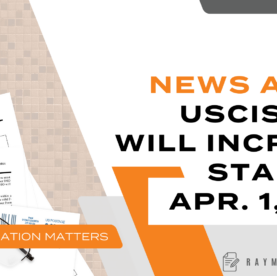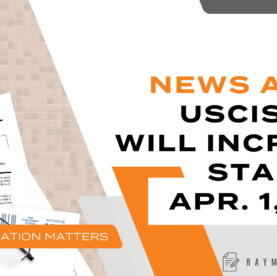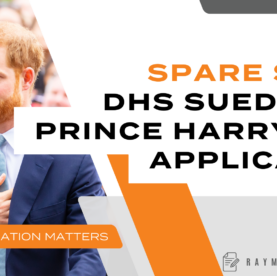H-1B Non-Immigrant Temporary Specialty Worker Visa Denials Quadruple in 2019

An analysis of U.S. Citizenship & Immigration Services (USCIS) data between 2015 and 2019 related to H-1B, Specialty Occupation non-immigrant visa petitions shows denials of H-1B initial employment petitions have quadrupled for both initial H-1B petitions and those seeking the continuation of employment with the same employer.
About the USCIS Analysis Data
In a recently released report, the National Foundation for American Policy (NFAP) concluded that “as a result of more restrictive Trump administration policies, denial rates for H-1B petitions have increased significantly, rising from 6% in FY 2015 to 24% through the third quarter of FY 2019 for new H-1B petitions for initial employment.”
Moreover, [i]n the first three quarters of FY 2019, USCIS adjudicators denied. . . 12% of H-1B petitions for ‘continuing’ employment. The 12% denial rate for continuing employment is [] historically high – 4 times higher than the denial rate of only 3% for H-1B petitions for continuing employment as recently as FY 2015.”
In conducting the analysis, the NFAP defined H-1B petitions for “initial” employment as those “primarily for new employment, typically a case that would count against the H-1B annual limit.” H-1B petitions for “continuing” employment were of “extensions for existing employees at the same company or an H-1B visa holder changing to a new employer.”
Of those H-1B petitions approved, there exists no data on the number that were served with Requests for Evidence (RFEs), which require the petitioning employer to respond to specific requests for documents and information from USCIS, and to provide additional supporting evidence and legal arguments in support of the qualifications of the job offered and the employee for the H-1B program.
About the H-1B Temporary Specialty Worker Program
The H-1B nonimmigrant visa program allows U.S. employers to sponsor foreign nationals to temporarily relocate to the United States to work in a position that is deemed a “specialty occupation,” which is broadly defined as a position that normally requires the minimum of a bachelor’s degree, or higher, in a specialty field. The H-1B program permits temporary employment for an initial duration of up to three years with extensions available to allow a foreign national to hold H-1B status for no more than six years.
To qualify for the H-1B temporary nonimmigrant specialty worker program, there must exist an employer-employee relationship, or the intent to enter into an employer-employee relationship if the H-1B petition is approved. The employer is required to pay at least the actual wage or the U.S. Department of Labor (DOL) prevailing wage, whichever is higher, and must seek certification of the job from the DOL through the filing of a labor condition application. Moreover, the foreign national’s field of study must relate to the job offered and must qualify as a “specialty occupation.” The Immigration & Nationality Act (INA) defines a “specialty occupation” as one that meets at least one of the following:
- A bachelor’s or higher degree, or its equivalent is normally the minimum requirement for the particular position
- The degree requirement is common for the position in the industry or the job is so complex or unique that it can only be performed by someone with at least a bachelor’s degree in a field related to the position
- The employer normally requires a degree or its equivalent for the position
- The nature of the specific duties is so specialized and complex that the knowledge required to perform the duties is usually associated with the attainment of a bachelor’s or higher degree
What Employers Should Know
Employers should not be tempted to download forms from the internet and file H-1B petitions alone, or, leave the matter with a company’s human resource department. Competent immigration legal representation is necessary to ensure that each submission is thoroughly drafted and well supported by evidence and memorandums in support.
The process is not as easy as it seems. The increase in denials of H-1B petitions for continuing employment makes this clear. In these cases, a foreign employee is already employed in the offered position pursuant to an already approved H-1B petition. The petitioning employer is simply seeking an extension of the same employment for the same employee under the same visa program. The outcome, however, has become increasingly different and unpredictable.
Nonetheless, access to the global workforce for talent, without borders, is critical to ensure continued competitiveness for businesses of all sizes. It is in these uncertain, but necessary times that competent legal representation is even more important, to ensure the rights of the employer are protected while giving every U.S. employer to lawful employment-based immigration for workforce development.
To learn more about this post or any other immigration matter, please feel free to contact me at rglahoud@norris-law.com.





